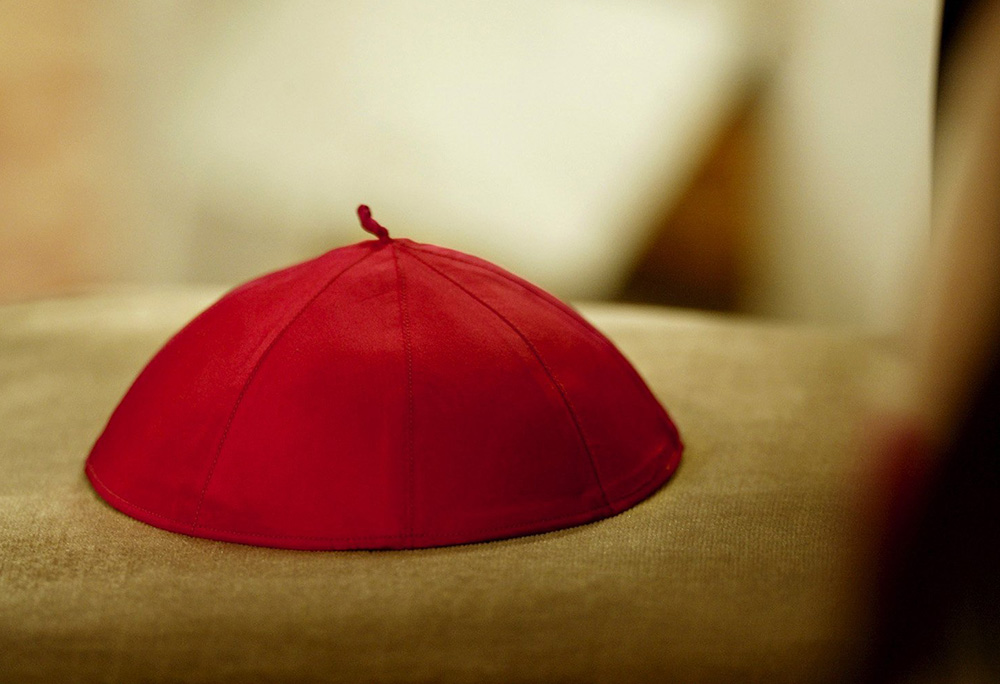
A cardinal's zucchetto, or skull cap, sits on a chair during an ordination Mass at St. Peter's Basilica. (CNS/Reuters/Paolo Cocco)
In my decades of covering religion, most of them focused on the Roman Catholic Church, I spent little time with cardinals or cardinals-to-be. At least that I was aware of.
The interaction with that level of the church normally occurred at the hierarchy's twice-a-year national meetings or at special events where cardinals and cardinal-wannabes controlled the microphone and gave largely meaningless responses to reporters' questions. Members of that exclusive club were fairly monochromatic, largely deodorized against the smell of the sheep, and apparently determined to hold fast to the literal meaning of the appellation "prince of the church," with all of the attendant privileges and prerogatives.
Things can change. And with the announcement that San Diego Bishop Robert McElroy will become a cardinal, I was nudged to recall that, in retrospect, I had unwittingly had meaningful encounters with three cardinals-to-be. They were very unlikely candidates, in places where aspiring cardinal types were not usually found, saying and doing the kinds of things that aspiring cardinal types normally avoid.
Gregorio Rosa Chávez
I visited El Salvador for Religion News Service soon after the signing of the 1992 peace accords, which achieved a ceasefire between government forces and the Farabundo Marti National Liberation Front. While there, I spent an afternoon with San Salvador Auxiliary Bishop Gregorio Rosa Chávez.
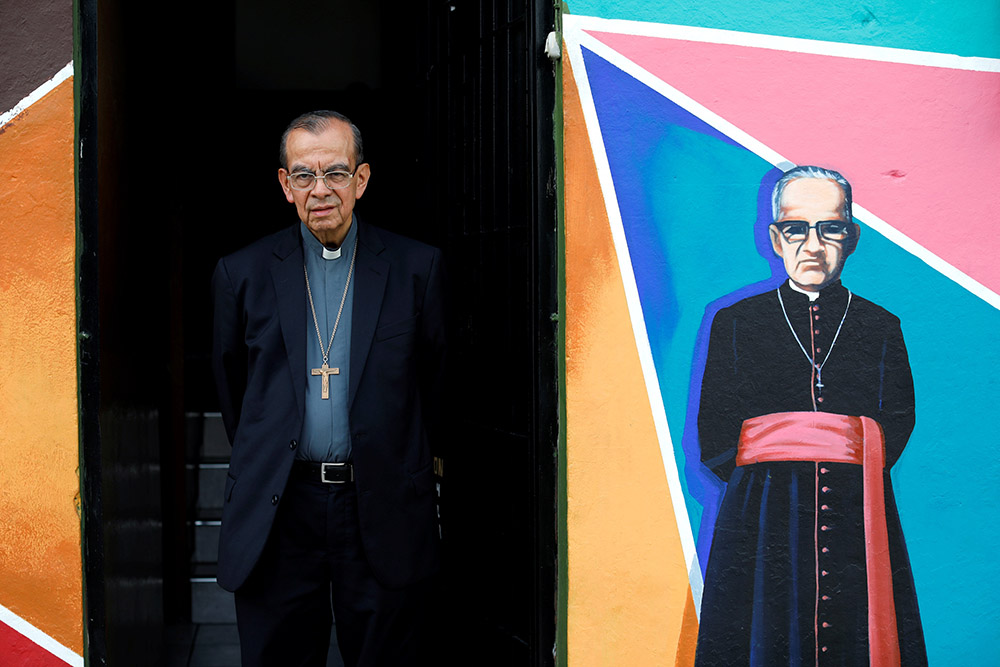
Cardinal Gregorio Rosa Chávez poses at his residence in San Salvador, El Salvador, next to a mural of St. Óscar Romero in 2018. (CNS/Reuters/Jose Cabezas)
The clips are long buried somewhere, but I've never forgotten a portion of the conversation during which he explained his attempt to influence those implementing the peace plan. Some wanted to avoid holding accountable those responsible for the deaths — often of civilians and government critics — of some 75,000 people. Rosa Chávez, instead, wanted to apply the wisdom of sacramental theology in this very Catholic country. The sins, he said, had to be named before genuine forgiveness was possible.
El Salvador has remained a torn country suffering waves of violence and creating well-known martyrs such as St. Óscar Romero, and thousands of lesser-known saints. Rosa Chávez, to this day an auxiliary bishop, was named a cardinal in 2017. Pope Francis' cardinal picks are often extraordinary people far from the centers of clerical power and privilege.
Álvaro Ramazzini Imeri
In the summer of 2013, I returned to do a long trip through a large section of Guatemala, a country I first visited in 1981 during one of the most intense periods of its 36-year civil war. I had returned several times in the intervening years, especially to stay in contact with the religious forces attempting to establish a just and workable civil society.
During that 2013 trip, I had the pleasure of spending a day in Guatemala's breathtakingly beautiful Western Highlands with Huehuetenango Bishop Álvaro Ramazzini Imeri.
In my report of the encounter, I described him as "out of central casting" for Francis' description of a good bishop: one who lived simply, "divested of royal trappings and unafraid to smell like the sheep."
Ramazzini, I wrote, is "a stocky man with thick arms, a square, open face and a quick smile" who kept home and office "in a modest diocesan complex."
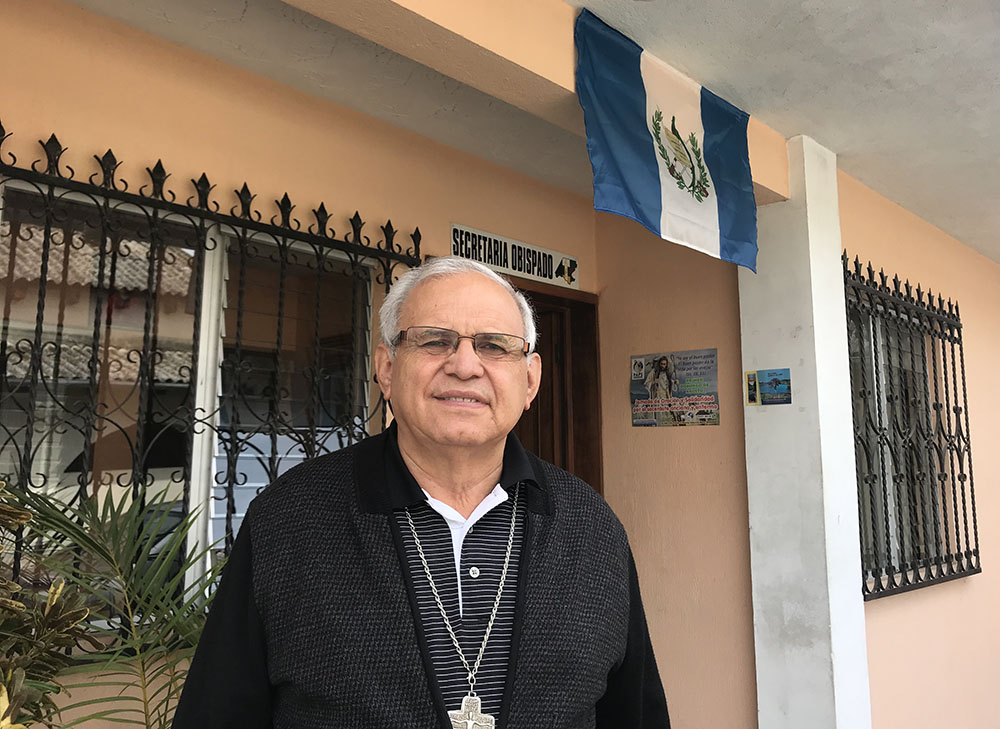
Guatemalan Cardinal Álvaro Ramazzini Imeri outside his diocesan office in Huehuetenango in 2019 (CNS/David Agren)
"He is without ceremony or pretense, and he is deeply engaged in issues facing the people of the Western Highlands," I wrote. "The day in June that we met, he was wearing a light blue clerical shirt, sans pectoral cross and open at the top. One end of a white clerical collar stuck out of his breast pocket. He was scheduled that morning to be one of three speakers on a panel addressing the next steps in a community's action against police who had shot and killed six and injured 40 during an Oct. 4, 2012, protest of increases in utility rates."
As we took off for the two-hour drive to that meeting, he insisted I sit in the front next to the driver. After a brief time with an interpreter, it was clear that Ramazzini was fluent in English. The conversation was riveting and went on for most of the ride to and from.
Ramazzini has survived several death threats for his advocacy of the rights of Indigenous people whose water supplies and other natural resources are threatened by major mining and other extractive industries from outside Guatemala. In one instance, a man stopped some nuns and showed them a handgun with the message that it would be used on their bishop if he didn't change his ways.
This is a country where the threat to religious liberty can be profound and direct, where the destructive results of unrestrained capitalism (the preferred economics of certain Catholic business schools in the U.S.) are distressingly evident, and where a bishop like Ramazzini has to rely on 10,000 trained lay ministers to serve parishes with thousands of members spread over large, remote territories.
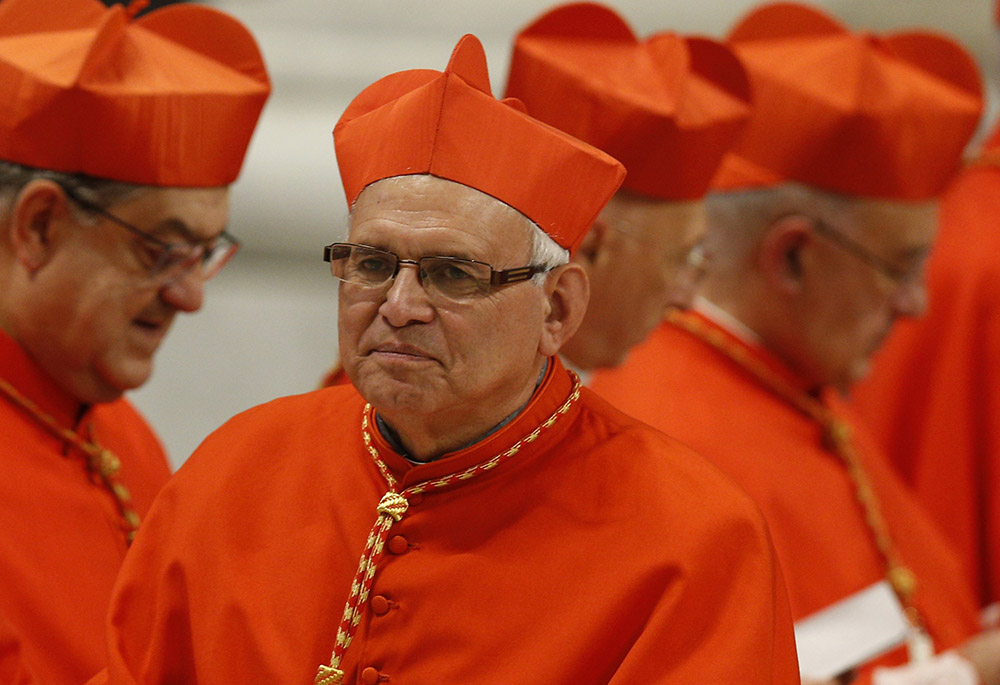
New Cardinal Álvaro Ramazzini Imeri of Huehuetenango, Guatemala, during a consistory for the creation of 13 new cardinals in St. Peter's Basilica at the Vatican Oct. 5, 2019 (CNS/Paul Haring)
The headline of the piece that ran in NCR was "A church that requires a different kind of bishop." It was describing the church in that corner of Guatemala. But you can take the sentiment global.
Had he been a cardinal wannabe seeking career counseling Ramazzini might have heard: "Get out of here."
He's still there, and Francis named him a cardinal in 2019.
Robert McElroy
I was on a reporting trip to San Francisco in 2010 when I kept hearing about a newly appointed auxiliary bishop named Robert McElroy. In different settings, two characteristics emerged simultaneously as descriptive of the new bishop, whether from high-level academics or ordinary parishioners. McElroy was repeatedly praised as a remarkable pastor who knew how to listen and develop lay leadership and, as a bonus, was a terrific preacher. He was also described by academics and theologians as "the brightest person in the room."
A Harvard University undergrad with a master's and doctorate in politics from Stanford University and a doctorate in theology from the Pontifical Gregorian University* in Rome, McElroy presented an unusual combination of disciplines for a bishop. When I returned to the East Coast, I called him and said I'd heard a lot about him and asked if he'd consent to an interview.
He did, and that winter we sat one day in the rectory of St. Gregory Parish in San Mateo for an interview that ranged widely over pastoral approaches that he prefers, as well as difficult issues of abortion politics and war and peace. He stood by his earlier criticism of "weaponizing" the Eucharist in partisan political fights. He wasn't giving the normal anodyne answers of the clerically ambitious.
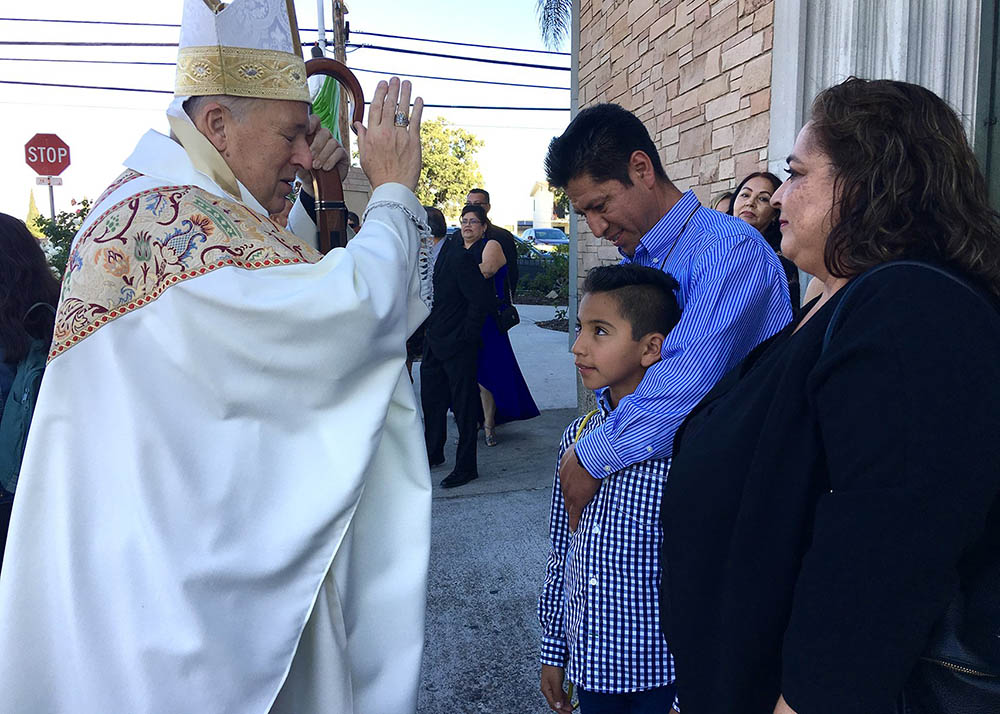
Bishop Robert McElroy of San Diego blesses the faithful following a Mass at St. Anthony Church Nov. 2, 2019. (CNS/San Diego Diocese/Aida Bustos)
When he described priests who inspired him and the kind of pastoral activities he saw as important, he used the terms "empathy," "nurturing," "willingness to admit mistakes," "listening," "eager to grow."
He acknowledged that pastors have to deal with divisions within a parish. "But at least in a parish like this or other parishes where I've been, people usually aren't asking you to be with them on every single issue."
In 2017, after he had been named bishop of San Diego, he agreed to another long interview, this one focused exclusively on the book The Search for an American Public Theology: The Contribution of John Courtney Murray, which had been his dissertation and was published by Paulist Press in 1989.
I had read the book before that earlier interview, and it was liberally tabbed and underlined and scrawled upon. But that conversation took paths into areas I was unwilling to alter, so the book remained in the background. This time, however, in an extensive interview at the diocesan center in San Diego, McElroy unpacked some of the themes, presciently developed by Murray a half century ago and relevant to this day.
He spoke candidly and with alarm about the state of the church in the United States and the condition of the country as trust in both was waning. The abuse crisis, he said, had "compromised the church's moral authority tremendously."
Yet he believed that the church, with other institutions, could play a role in re-establishing public trust.
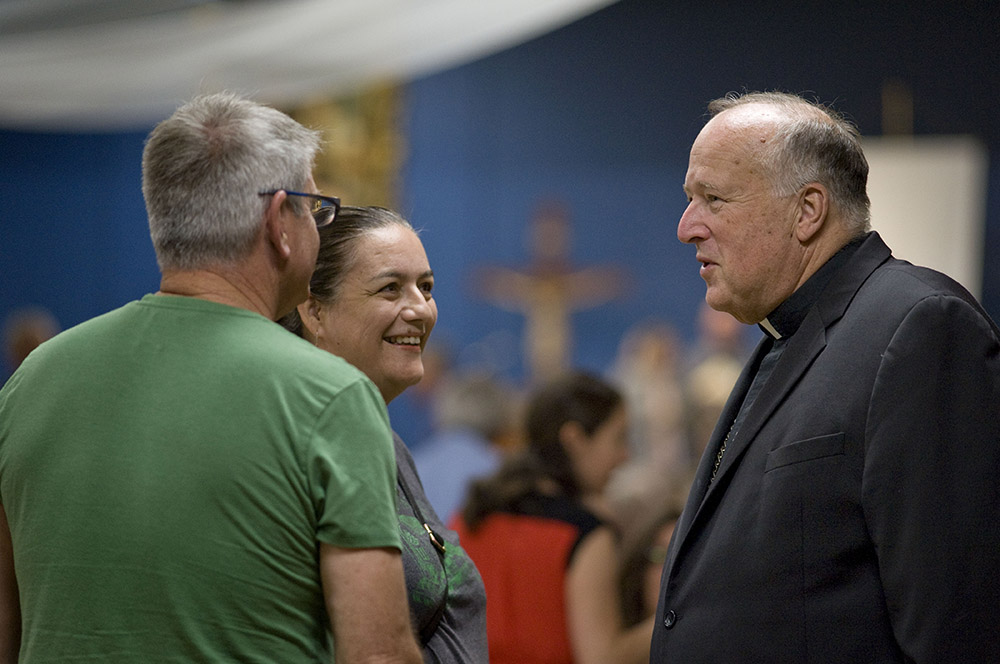
Bishop Robert McElroy chats with attendees arriving for a listening session on the issue of clergy sexual abuse Oct. 1, 2018, at Our Mother of Confidence Parish Hall in San Diego. (CNS/David Maung)
"I'm very alarmed about where we're going. I believe we're in a cultural crisis in our body politic," he said. "And it's only going to get worse. It's just a question of how is it going to get worse. Is it going to get worse at a moment of great crisis? Or are we going to go through all these years of this? And even when this is done, when President Trump is gone, are we just going to fall back into the same pattern we've been in?"
This wasn't the behavior of a cardinal wannabe. A career counselor might well have advised him to steer clear of critiquing his brother bishops on the abortion politics stuff and to leave politics alone entirely, especially criticisms of Donald Trump.
He surely would have been advised to steer clear of Aaron Bianco, the gay church worker who was harassed and threatened and finally resigned his parish position. But McElroy did the opposite, publicly supporting Bianco and condemning the violent threats and vandalism Bianco experienced. "The hatred that lies behind them constitutes a dark and vicious corner in the life of our church that every member of the Catholic community must reject," McElroy said.
Inhabitants of that dark and vicious corner are already at it, attempting to smear and diminish McElroy, who, like others appointed cardinals by Francis, goes against type and tends to render the old hierarchical playbook obsolete.
Advertisement
Finding future cardinals elsewhere
A rule of thumb I kept while news editor of Religion News Service from the mid-1980s to mid-1990s and as editor at NCR in the following decades was that members of the hierarchy could get the coverage they wanted and felt they needed whenever they wished from major outlets. The more important and significant religion stories, in my estimation, were most often to be found elsewhere.
The exceptions to the rule, of course, were the Vatican — the seedbed of hierarchical culture — and coverage of the sex abuse crisis. In the latter case, cardinals such as Anthony Bevilacqua, Bernard Law, Justin Rigali, Roger Mahony, Edward Egan and, later, Theodore McCarrick — to mention some of the most notable among the ecclesial rogues' gallery — were often the main characters in our stories. But they weren't sitting for interviews.
I didn't know along the way that in looking elsewhere I was encountering future cardinals. I just knew that I was meeting courageous churchmen who were quite different from others who grabbed our attention because they reflected a deeply corrupt culture.
I still think the hierarchical culture is profoundly affected by that history of corruption and has not squared up with that truth. But appointments of men who have demonstrated how the culture might regain the trust of those it purportedly serves is a great step in the right direction.
One last thought. Those were some of the courageous and distinctive men I've met in my reporting chores over the years. Should Francis wish access to the list of remarkable, smart, dedicated and holy women — often on the margins of church and society — that I've interviewed over those same decades, I'd be happy to share it.
*Correction: This article originally misidentified the institution from which McElroy earned his doctorate in theology. We apologize for the error.





